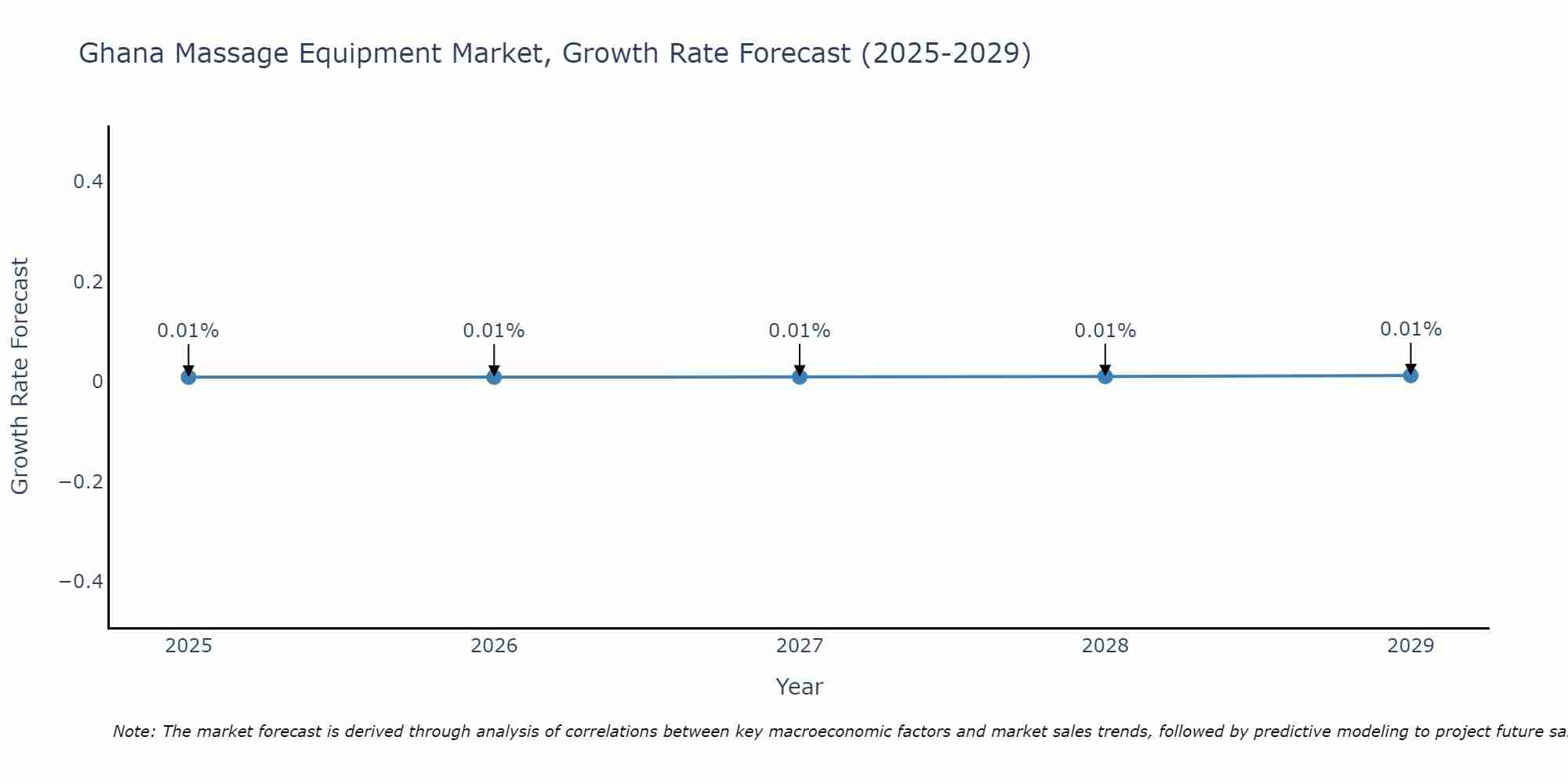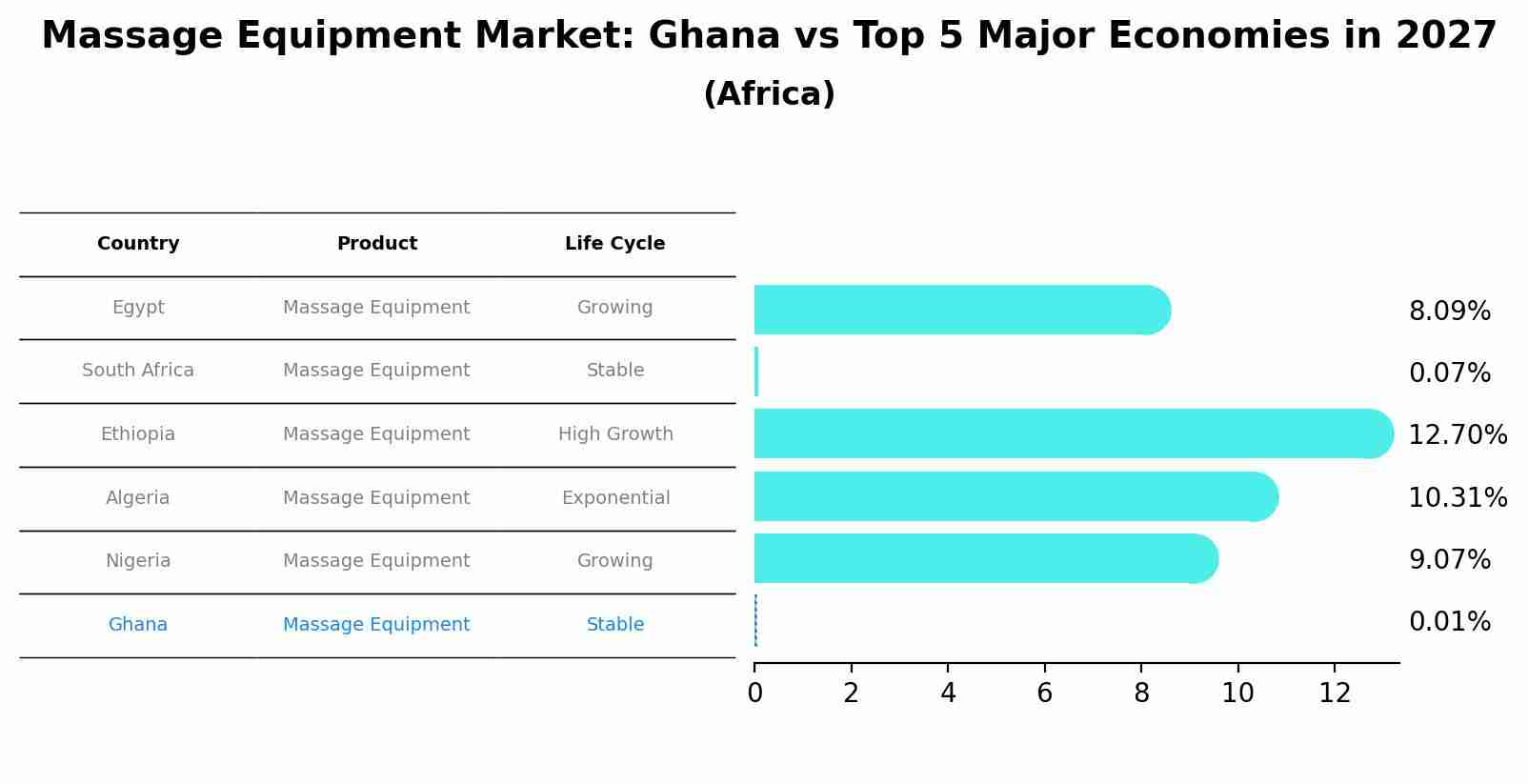Ghana Massage Equipment Market (2025-2031) Outlook | Trends, Growth, Companies, Analysis, Share, Industry, Forecast, Size, Value & Revenue
| Product Code: ETC366596 | Publication Date: Aug 2022 | Updated Date: Jul 2025 | Product Type: Market Research Report | |
| Publisher: 6Wresearch | Author: Shubham Padhi | No. of Pages: 75 | No. of Figures: 35 | No. of Tables: 20 |
Ghana Massage Equipment Market Size Growth Rate
The Ghana Massage Equipment Market is poised for steady growth rate improvements from 2025 to 2029. The growth rate starts at 0.01% in 2025 and reaches 0.01% by 2029.

Massage Equipment Market: Ghana vs Top 5 Major Economies in 2027 (Africa)
In the Africa region, the Massage Equipment market in Ghana is projected to expand at a stable growth rate of 0.01% by 2027. The largest economy is Egypt, followed by South Africa, Ethiopia, Algeria and Nigeria.

Ghana Massage Equipment Market Synopsis
The Ghana Massage Equipment Market is experiencing steady growth driven by increasing awareness of the benefits of massage therapy for health and wellness. Key factors contributing to market expansion include rising disposable incomes, a growing middle-class population, and a shift towards a more health-conscious lifestyle. The market offers a wide range of massage equipment such as massage chairs, handheld massagers, massage oils, and massage tables, catering to both professional and personal use. With a rising number of spas, wellness centers, and healthcare facilities incorporating massage therapy into their services, the demand for quality massage equipment is expected to continue growing in Ghana. Additionally, the increasing popularity of home-based massage treatments further fuels the market`s growth, presenting opportunities for both local and international manufacturers and suppliers to meet the evolving needs of consumers in Ghana.
Ghana Massage Equipment Market Trends
The Ghana Massage Equipment Market is experiencing a growing demand for portable and handheld massage devices, driven by the increasing awareness of the benefits of massage therapy for relaxation and stress relief. Consumers are seeking compact and convenient tools that they can use at home or on the go. Additionally, there is a rising interest in advanced massage technologies, such as electric massagers with customizable settings and heat therapy features. The market is also witnessing a trend towards eco-friendly and sustainable materials in massage equipment, reflecting the growing consumer preference for environmentally conscious products. Overall, the Ghana Massage Equipment Market is evolving to cater to the changing needs and preferences of consumers, with a focus on convenience, technology, and sustainability.
Ghana Massage Equipment Market Challenges
In the Ghana Massage Equipment Market, challenges primarily stem from the limited awareness and adoption of massage therapy among the general population. This lack of awareness leads to a relatively small market size and low demand for specialized massage equipment. Additionally, economic factors such as high import duties and taxes on massage equipment can significantly increase the cost for both businesses and consumers, thereby hindering market growth. Furthermore, the presence of counterfeit or low-quality products in the market poses a challenge to established brands aiming to maintain credibility and trust among consumers. Overall, increasing awareness about the benefits of massage therapy, addressing pricing concerns, and ensuring product quality control are crucial steps to overcome these challenges and stimulate growth in the Ghana Massage Equipment Market.
Ghana Massage Equipment Market Investment Opportunities
The Ghana Massage Equipment Market presents promising investment opportunities due to the increasing awareness and demand for wellness services in the country. With the growing focus on health and relaxation, there is a rising interest in massage therapy, creating a market for various types of massage equipment such as massage chairs, tables, oils, and accessories. Investing in this market offers potential for growth as the Ghanaian population becomes more health-conscious and seeks alternative therapies for stress relief and relaxation. Additionally, the tourism industry in Ghana provides an additional avenue for investment in high-quality massage equipment to cater to the needs of tourists seeking spa and wellness services during their visits. Overall, the Ghana Massage Equipment Market offers a favorable environment for investors looking to capitalize on the expanding wellness industry in the country.
Jordan Agar Market Government Policies
The Ghanaian government does not have specific policies related to the massage equipment market. However, the general regulatory framework for imports and sales of medical devices applies to massage equipment as well. The Food and Drugs Authority (FDA) is responsible for regulating the importation, manufacturing, distribution, and sale of medical devices in Ghana, including massage equipment. Importers and distributors must ensure compliance with FDA regulations, including registration and quality standards, to ensure the safety and efficacy of the products. Overall, the government`s focus on ensuring the quality and safety of medical devices indirectly impacts the massage equipment market in Ghana, emphasizing the importance of compliance with regulatory requirements for market access.
Ghana Massage Equipment Market Future Outlook
The Ghana Massage Equipment Market is expected to witness steady growth in the coming years due to increasing awareness about the benefits of massage therapy for overall well-being and health. Factors such as rising disposable income, a growing middle-class population, and a shift towards a more health-conscious lifestyle are driving the demand for massage equipment in the region. Additionally, the tourism industry in Ghana is also contributing to the growth of the market as tourists seek relaxation and rejuvenation services. The market is likely to see a surge in the adoption of advanced massage equipment with features like customization, portability, and technology integration. Overall, the Ghana Massage Equipment Market is poised for expansion and innovation in the upcoming years, presenting opportunities for market players to capitalize on the growing demand.
Key Highlights of the Report:
- Ghana Massage Equipment Market Outlook
- Market Size of Ghana Massage Equipment Market, 2024
- Forecast of Ghana Massage Equipment Market, 2031
- Historical Data and Forecast of Ghana Massage Equipment Revenues & Volume for the Period 2021 - 2031
- Ghana Massage Equipment Market Trend Evolution
- Ghana Massage Equipment Market Drivers and Challenges
- Ghana Massage Equipment Price Trends
- Ghana Massage Equipment Porter's Five Forces
- Ghana Massage Equipment Industry Life Cycle
- Historical Data and Forecast of Ghana Massage Equipment Market Revenues & Volume By Product for the Period 2021 - 2031
- Historical Data and Forecast of Ghana Massage Equipment Market Revenues & Volume By Chairs & Sofas for the Period 2021 - 2031
- Historical Data and Forecast of Ghana Massage Equipment Market Revenues & Volume By Back Massagers for the Period 2021 - 2031
- Historical Data and Forecast of Ghana Massage Equipment Market Revenues & Volume By Handheld for the Period 2021 - 2031
- Historical Data and Forecast of Ghana Massage Equipment Market Revenues & Volume By Neck & Shoulder for the Period 2021 - 2031
- Historical Data and Forecast of Ghana Massage Equipment Market Revenues & Volume By Others for the Period 2021 - 2031
- Historical Data and Forecast of Ghana Massage Equipment Market Revenues & Volume By Application for the Period 2021 - 2031
- Historical Data and Forecast of Ghana Massage Equipment Market Revenues & Volume By Commercial for the Period 2021 - 2031
- Historical Data and Forecast of Ghana Massage Equipment Market Revenues & Volume By Home for the Period 2021 - 2031
- Ghana Massage Equipment Import Export Trade Statistics
- Market Opportunity Assessment By Product
- Market Opportunity Assessment By Application
- Ghana Massage Equipment Top Companies Market Share
- Ghana Massage Equipment Competitive Benchmarking By Technical and Operational Parameters
- Ghana Massage Equipment Company Profiles
- Ghana Massage Equipment Key Strategic Recommendations
Frequently Asked Questions About the Market Study (FAQs):
- Single User License$ 1,995
- Department License$ 2,400
- Site License$ 3,120
- Global License$ 3,795
Search
Thought Leadership and Analyst Meet
Our Clients
Related Reports
- Afghanistan Apparel Market (2026-2032) | Growth, Outlook, Industry, Segmentation, Forecast, Size, Companies, Trends, Value, Share, Analysis & Revenue
- Canada Oil and Gas Market (2026-2032) | Share, Segmentation, Value, Industry, Trends, Forecast, Analysis, Size & Revenue, Growth, Competitive Landscape, Outlook, Companies
- Germany Breakfast Food Market (2026-2032) | Industry, Share, Growth, Size, Companies, Value, Analysis, Revenue, Trends, Forecast & Outlook
- Australia Briquette Market (2025-2031) | Growth, Size, Revenue, Forecast, Analysis, Trends, Value, Share, Industry & Companies
- Vietnam System Integrator Market (2025-2031) | Size, Companies, Analysis, Industry, Value, Forecast, Growth, Trends, Revenue & Share
- ASEAN and Thailand Brain Health Supplements Market (2025-2031) | Strategy, Consumer Insights, Analysis, Investment Trends, Opportunities, Growth, Size, Share, Industry, Revenue, Segments, Value, Segmentation, Supply, Forecast, Restraints, Outlook, Competition, Drivers, Trends, Demand, Pricing Analysis, Competitive, Strategic Insights, Companies, Challenges
- ASEAN Bearings Market (2025-2031) | Strategy, Consumer Insights, Analysis, Investment Trends, Opportunities, Growth, Size, Share, Industry, Revenue, Segments, Value, Segmentation, Supply, Forecast, Restraints, Outlook, Competition, Drivers, Trends, Demand, Pricing Analysis, Competitive, Strategic Insights, Companies, Challenges
- Europe Flooring Market (2025-2031) | Outlook, Share, Industry, Trends, Forecast, Companies, Revenue, Size, Analysis, Growth & Value
- Saudi Arabia Manlift Market (2025-2031) | Outlook, Size, Growth, Trends, Companies, Industry, Revenue, Value, Share, Forecast & Analysis
- Uganda Excavator, Crane, and Wheel Loaders Market (2025-2031) | Strategy, Consumer Insights, Analysis, Investment Trends, Opportunities, Growth, Size, Share, Industry, Revenue, Segments, Value, Segmentation, Supply, Forecast, Restraints, Outlook, Competition, Drivers, Trends, Demand, Pricing Analysis, Competitive, Strategic Insights, Companies, Challenges
Industry Events and Analyst Meet
Whitepaper
- Middle East & Africa Commercial Security Market Click here to view more.
- Middle East & Africa Fire Safety Systems & Equipment Market Click here to view more.
- GCC Drone Market Click here to view more.
- Middle East Lighting Fixture Market Click here to view more.
- GCC Physical & Perimeter Security Market Click here to view more.
6WResearch In News
- Doha a strategic location for EV manufacturing hub: IPA Qatar
- Demand for luxury TVs surging in the GCC, says Samsung
- Empowering Growth: The Thriving Journey of Bangladesh’s Cable Industry
- Demand for luxury TVs surging in the GCC, says Samsung
- Video call with a traditional healer? Once unthinkable, it’s now common in South Africa
- Intelligent Buildings To Smooth GCC’s Path To Net Zero


















